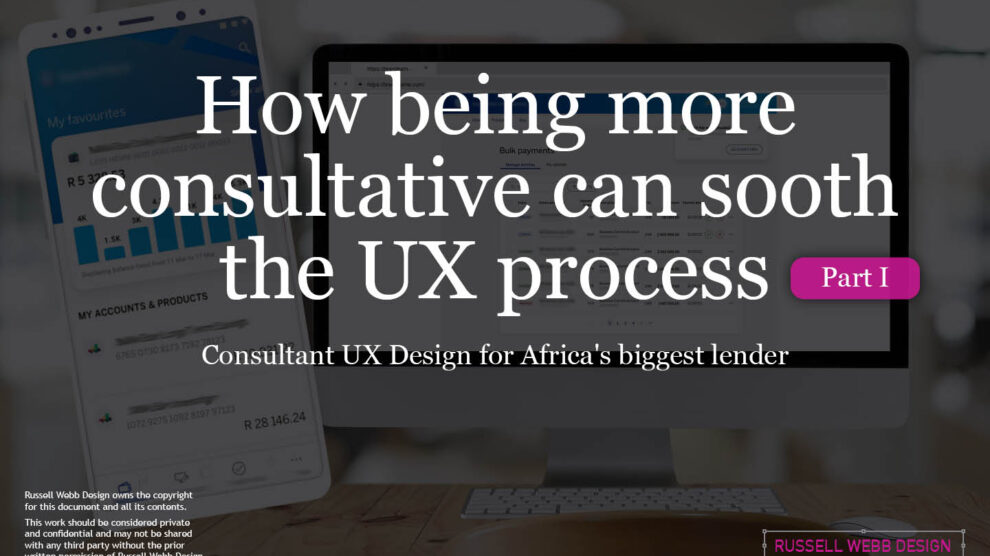TL;DR; Boost your workflow without breaking a Zoom sweat in this COVID-friendly remote special.
—
Simplify KO’s, pinpoint problems, and find your perfect toolset—faster than a remote ping. Discover the limits of your daily grind. Then, unleash the life-saving power of Dual Track UX Delivery as a consultative designer.
Hard Skills:
Journey Mapping
Research
Visual Design
Soft Skills:
Empathy
Collaboration
Critical Thinking
This is Part 1 of a two-part article looking at improved Ways of Working from a consultative UX perspective. I will be concentrating on;
Jump forward to Part II, I will be deep-diving into;
- Real world examples
- Ways of Working
- Dual track UX
- Signposting
- Conclusion
- My Top 9 Take-aways
Simplifying the KO process
To streamline a more Covid-friendly kick-off (KO) process it has always been a good idea to define, from the get-go, your playing field. To ensure you are tooled-up with all the relevant software and get valid logins for EVERYTHING.

Who are your colleagues? What is their vested involvement? Find out how they respond.Humans are fickle creatures, designers especially – try and mesh with your teams preferred WoW and integrate it into your workflow.
This is even more relevant in today’s remote COVID-friendly environment, financial institutions have their preferred toolkits and regulations prevent working out of this ‘walled garden’. To achieve maximum results without upsetting the apple cart too much, streamline your process to fit. Then make incremental improvements.
Design and deliver a Kick-Off or Handover UX / UI document

Whether someone is handing over to you, or vice-versa, make a checklist to include the following;
• The key players.
• Project timelines.
• Important links.
• Ceremony meetings.
• Project insights.
Defining problems to solve
New projects or hand-overs can be problematic without the right signposts in-place. As for disorganised libraries … don’t get me started!
Streamline designs, processes and messages

Some blockers you may experience as a UX-er at the coalface;
• Mixed messages.
• No single source of truth.
• Continual fire-fighting.
• Unmanageable libraries / tools.
Managing libraries

Adhering to the company’s design system and demonstrating in-depth knowledge of a client’s design system is a challenge.
4+ libraries, multiple ‘color‘, ‘colors‘ and ‘colours’ can derail your process
Within your design files, labelling ‘1 colours/2 primary’ etc is ideal, but with an ever changing landscape and differing quality standard libraries to go downhill… So, make them work for you, not the other way around.

Too many icons, too many colours/colors/color, inheriting multiple libraries, with icons and colours not catalogued well will treble your inefficiencies… or worse
When a client questions the use of their brand colours, and you defend your library structure only to realise you should have used the other ‘1 primary blue’… this doesn’t build confidence with your clients. Correct labelling and signposting can save projects
Tools and their limits
Use the digital tools at your disposal, to make your digital work/ life easier. If they don’t do that, move on.
Invision
The so-called industry standard… but is it?
“InVision Studio used to be hard to beat, especially if you have to collaborate with a team. It may not be as powerful as Adobe XD, but it’s still one of the best prototyping tools you’ll find.”
www.elegantthemes.com

A designers preference
From swim lanes that make sense to managing conflicts on different platforms fitting into the clients wow can build bridges but managing multiple platforms with multiple messages has it’s limit.
Zeplin
“Organising projects with tons of exported screens is a huge hassle (especially if the project was not organised properly from the beginning). Use tags and sections to group screens but if you’re designing complex products, you will probably find that is not to be enough”
Product review.

Base level syncing issues
The design file is pixel perfect, but this hasn’t sync’d across to Zeplin. This gives developers and designs the wrong UI impression, and makes you look bad
Get the right permissions.

Application administered by a non-involved senior management is problematic. As the principal designer, you need control.
Demonstrate hidden tools
Although Zeplin maybe the perceived preferred tool for developers, sometimes going that extra mile explaining hidden features can help you and ease process. This works great from pdf / svg / png download settings, for example.

Cherry-picking preferred functionality sounds like the best of both worlds
Leverage functionality from differing platforms has its benefits, the problem arises when using both;
• Using Zeplin for comments on UI.
• Using Invision for comments on UI.
Accessed by different work groups, with conflicting agendas and without that joined team thinking is not going to work.
Continued this review on boosting your workflow without breaking a Zoom sweat in ‘Part-II How being more consultative can sooth the UX process COVID special’ I have a deep-diving into at Real world examples, simplify KO’s, and finding your perfect toolset

Pique’d your interest?
This is but part of a selection of design information russellwebbdesign generated for the creative community out there. Please contact me further to discuss how your brand can benefit from the new channel: info@russellwebbdesign.co.uk
If something has peaked your interest. Please leave a comment below.

Comments
One response to “Part 1; How being more consultative can sooth the UX process – COVID Special”
[…] the previous article I showcased a deep-dive […]